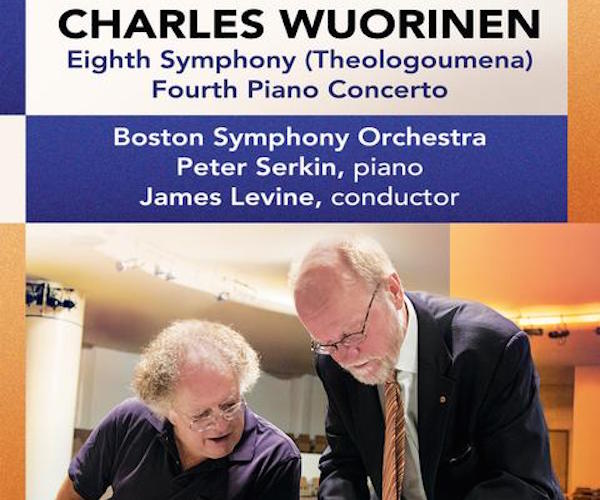CD Reviews: Andrew Manze conducts Mendelssohn and Charles Wuorinen’s Eighth Symphony et al.
No orchestra in this country embraces the challenges of Charles Wuorinen’s hyper-intellectual style better than the Boston Symphony Orchestra.
By Jonathan Blumhofer

Here is some great Mendelssohn from Andrew Manze and the NDR Radiophilharmonie (NDRP). Manze, who trained as a violinist with early music great Ton Koopman, finds more than a little common ground with Mendelssohn and his musical antecedents, Bach, Mozart, and Beethoven.
The Symphony no. 1 is a wonderfully underrated piece. It may not be an innovative masterpiece, but it’s cut from the same cloth as the Octet and the Overture to A Midsummer Night’s Dream, both of which it just precedes chronologically.
In this performance Manze and the NDRP play it brilliantly. Everything’s very lively. Rhythms snap. The lyrical writing sings. Inner voices – whether viola countermelodies or woodwind descants – speak with clarity and immediacy. All is invigorating.
And, in the process, the Symphony’s wonderful and odd features come out of the woodwork. The byzantine transition to the first movement’s coda, for instance – six-and-a-half bars of droning horns followed by an antiphonal dialogue between winds and strings – has, in my experience, rarely sounded weirder. So, too, the way the trio of the Scherzo works its way back to the da capo repeat.
In the Scottish Symphony, this same approach is put to a truly exceptional musical argument. The first movement proper burbles: Manze takes its “agitato” marking literally, resulting in a welcome, edgy reading of its main body; the noble sections that frame it sing with resonant warmth. His take on the second movement, too, is superb: it dances with great energy and style. And the rollicking finale drives vigorously to one of the most enlivening accounts of that movement’s coda this side of Georg Solti’s mid-‘80s recording of the piece with the Chicago Symphony.
The Pentatone disc’s most eyebrow-raising choice involves Manze’s quick tempo in the Scottish Symphony’s third movement. His pace is noticeably above what’s marked in the score. But there’s no sense of rushing through the drama – or the beauty – of what Mendelssohn wrote. In the end, it’s all very well (and expressively) thought out and executed.
Throughout, Manze’s interpretive gestures and liberties – holding back at certain structural points, driving the tempo a bit in spots – pay off. They all make musical sense but, equally important, help elucidate the score’s internal logic.
And the NDRP prove excellent partners in both pieces, responding to Manze’s leadership with energy, color, and the utmost clarity of purpose. They play these well-worn symphonies as though they’ve got something to prove in and about them. The results are thrilling, fully the equal of Abbado’s and Solti’s in this repertoire – next to whom they now sit on my shelf.

Some music is just plain difficult, including, by almost any definition, anything by Charles Wuorinen. The American Modernist’s Eighth Symphony and Fourth Piano Concerto, both out now in their debut recording from Bridge Records, reveal a composer as stylistically uncompromising as ever.
The Symphony, a three-part, through-composed essay subtitled “Theologoumena,” offers Wuorinen’s musical working out of an ancient theological argument: “suggest[ing]…a certain progress of mood or atmosphere” as its liner notes points out. Of course, whatever thesis Wuorinen means to explore might, when communicated via abstract pitches, be one of a million others – but let’s leave that problem alone for now.
As the music, itself, goes, there is more than a little to admire. The fast sections of the Symphony have spades of angular melodies and rhythmic verve. The scoring is exceptionally colorful, especially as it relates to Wuorinen’s writing for percussion instruments. Even the long slow movement includes striking, often pointilistic, instrumental dialogues over amorphous, multi-layered accompanimental textures and a strong sense of dramatic tension.
The Concerto inhabits much of the same style, even if it’s a bit less austere, and involves no (announced) extra-musical narrative.
As to the performances, it’s hard to imagine solo playing of greater technical command and control than Peter Serkin delivers in the Piano Concerto. James Levine and the Boston Symphony Orchestra (BSO) turn in an equally-involved accompaniment in that piece, as well as mighty, dynamic playing in the Symphony. No orchestra in this country embraces the challenges of Wuorinen’s hyper-intellectual style better than the BSO and, if the music on this disc really comes to life, it’s because of their (and Levine’s and Serkin’s) palpable advocacy.
Still, this is hard music to love. Wuorinen’s mastered the system of late-Schoenberg and -Stravinsky well. He adds his own severe voice to their chorus. It’s a music that represents a triumph of intellect over emotion, brain over heart. If that’s your cup of tea, more power to you: you’ll love this recording. If it’s not, at least you know what you’re getting yourself in to.
Jonathan Blumhofer is a composer and violist who has been active in the greater Boston area since 2004. His music has received numerous awards and been performed by various ensembles, including the American Composers Orchestra, Kiev Philharmonic, Camerata Chicago, Xanthos Ensemble, and Juventas New Music Group. Since receiving his doctorate from Boston University in 2010, Jon has taught at Clark University, Worcester Polytechnic Institute, and online for the University of Phoenix, in addition to writing music criticism for the Worcester Telegram & Gazette.
Tagged: Andrew Manze, Boston Symphony Orchestra, Bridge Records, Charles Wuorinen, James Levine, NDR Radiophilharmonie, Penatone
